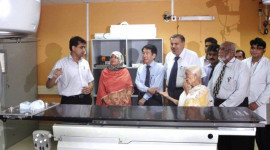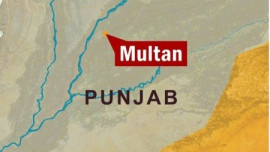
KARACHI: Thalassaemia can be devastating both for the patient and the family, especially if it results in early deaths. Haematologist Dr Tahir Shamsi explains how parents can save their child from this genetic disorder.
Gynaecologists and obstetricians can play a crucial role in the prevention of thalassemia if they ensure that all would-be mothers are tested for Mean Cell Volume (MCV) within the first 11 to 13 weeks of their first trimester, said Dr Shamsi.
“This test should be made mandatory to prevent this serious blood disease that cuts short the life of the thalassaemic major,” he said.
Dr Shamsi explained that the MCV test of pregnant women can be done without any additional expenses along with the Complete Blood Picture test, which women need to take under any circumstances .
The test is conducted to asses the size of red cells and if the result is below 75, the woman’s husband is also required to take the test, he said.
“When the MCV of both the husband and the wife is found less than 75, it means that they are both thalassaemia minor and any child born to them will be a thalassaemia major,” said Dr Shamsi.
If the mother has an MCV of more than 75, she is safe and so is the baby, he added.
According to Dr Shamsi, this simple intervention was most viable for a country like Pakistan, with its limited resources to screen babies for thalassaemia.
Around 30 per cent of the population of Sindh alone has thalassaemia major, he said, adding that there are only six centres in the private sector, with the exception of PNH-Shifa, providing screening services.
People need to be informed urgently that that prevention is the only viable option for this genetic disorder otherwise patients will have to go through frequent blood transfusions, Dr Shamsi believed. The average cost of each transfusion is between Rs200 and Rs300 and if you add the cost of drugs needed to prevent complications then the costs increase further, he added.
Patients usually experience a surge in the iron load of the recipients, as they lack the natural mechanism and if the iron load is left unchecked, it can damage essential human organs.
Bone marrow transplantation is the only way to treat thalassaemia but it is unaffordable for a majority of the population, said Dr Shamsi, adding that recent drugs, which are safe with no side-effects, have been introduced but they are difficult to procure for local patients.
Dr Shamsi further added that patients suffering from thalassaemia can also undergo therapy but it does not help with the ailment.
Published in The Express Tribune, August 7th, 2010.























































COMMENTS
Comments are moderated and generally will be posted if they are on-topic and not abusive.
For more information, please see our Comments FAQ